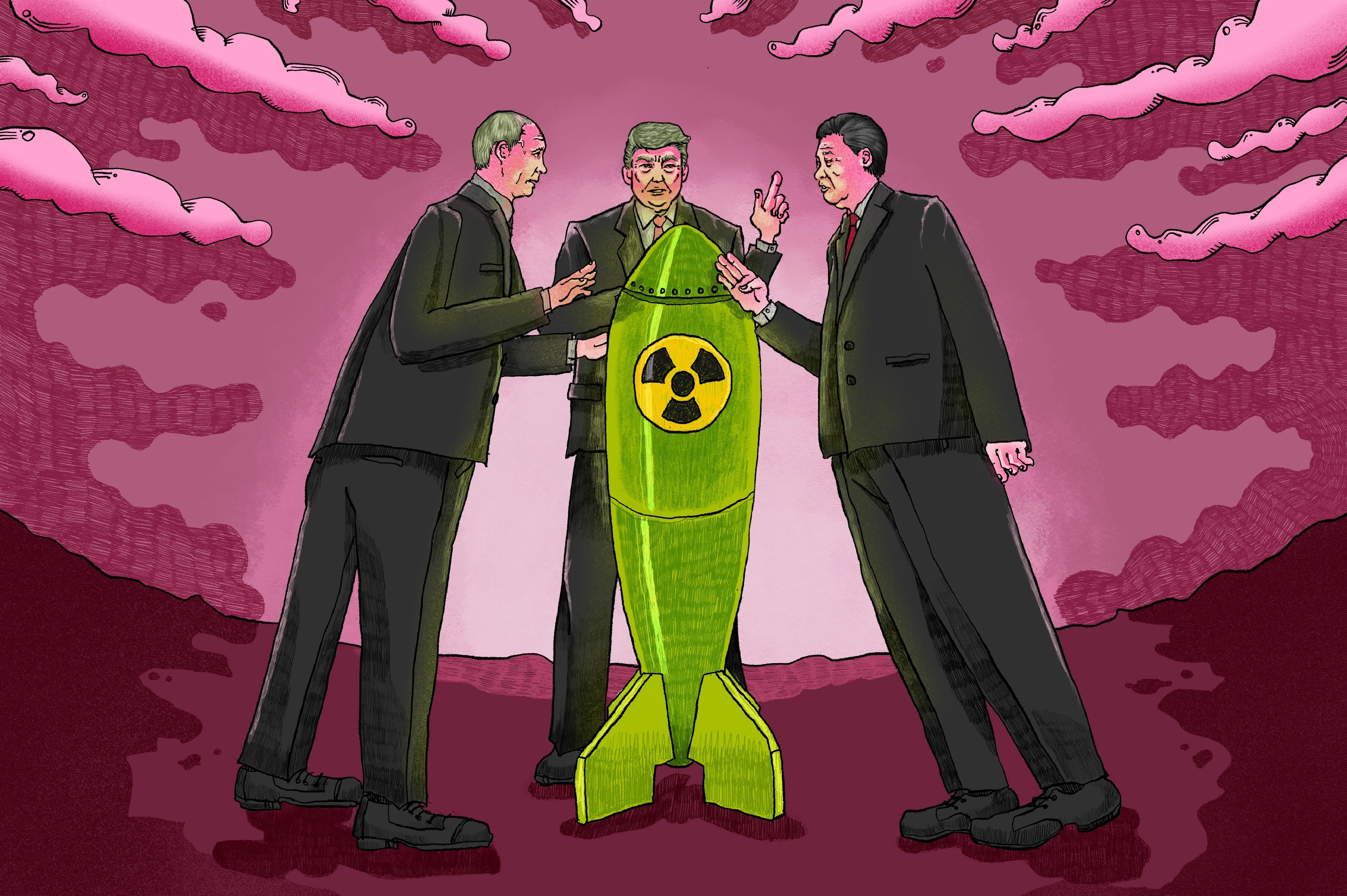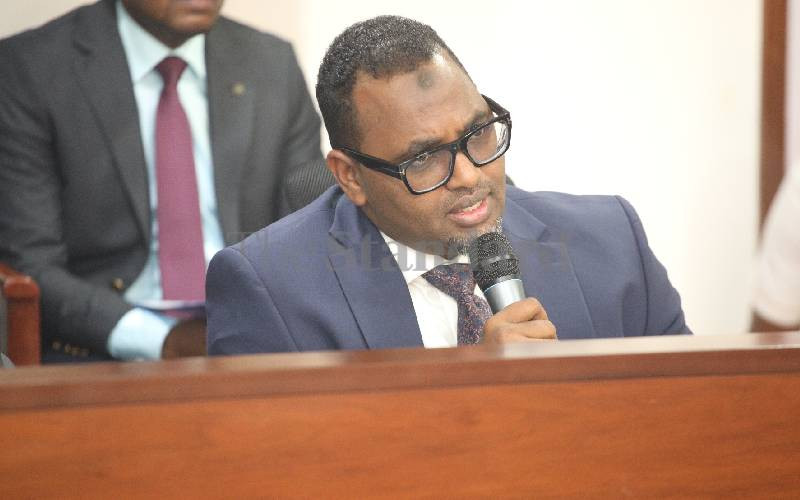By Shi Jiangtao
Copyright scmp

US President Donald Trump’s summit in Alaska last month with Russian leader Vladimir Putin failed to revive long-stalled nuclear negotiations or advance efforts to preserve the last major arms control pact between Washington and Moscow, which is set to expire in February.
Trump’s subsequent push for trilateral “denuclearisation” talks involving China elicited a firm refusal from Beijing, underscoring challenges to extending the New Strategic Arms Reduction Treaty (New START) amid fears of a fresh nuclear arms race, analysts said.
Following the summit, Beijing, with its long-standing policy of “no first use” and a nuclear strategy rooted in self defence, spurned Trump’s proposal, with Chinese foreign ministry spokesman Guo Jiakun calling it “neither reasonable nor realistic”.
“China’s nuclear strength is by no means on the same level as that of the US,” Guo said. “Our nuclear policy and strategic security environment are also completely different.”
For decades, China has stated it maintains its nuclear strength at the minimum level required by national security and that it never engages in an arms race with anyone.
But it is estimated to have accelerated its nuclear build-up, expanding its arsenal from roughly 500 warheads in early 2024 to about 600 by January 2025, according to the Stockholm International Peace Research Institute (SIPRI).
Projections indicate Beijing’s total could reach 1,000 warheads by 2030.
But China’s arsenal still remains significantly smaller than those of the US (5,177 warheads, 1,770 deployed) and Russia (5,459 warheads, 1,718 deployed), according to SIPRI.
In a pointed reference to Washington, Guo said: “The country sitting on the world’s biggest nuclear arsenal should earnestly fulfil its special and primary responsibility for nuclear disarmament, further make drastic and substantive cuts to its nuclear arsenal, and create conditions for the ultimate realisation of complete and thorough nuclear disarmament.”
Tong Zhao of the US-based Carnegie Endowment for International Peace said China was a key driver of American nuclear concerns and had remained largely indifferent to US-Russia New START outcomes.
“If the treaty expires, China could blame Washington – and Moscow – for undermining global arms control,” Zhao said. “If a new deal is reached, China benefits from continued constraints on US and Russian nuclear arsenals.”
New START, signed in 2010 by former US president Barack Obama and former Russian president Dmitry Medvedev, succeeded the 1991 Strategic Arms Reduction Treaty (START), which capped the number of deployed strategic nuclear warheads and delivery systems for both Washington and Moscow.
While START marked a major post-Cold War milestone by slashing US and Soviet nuclear arsenals by nearly 80 per cent, New START further limited them to 1,550 warheads on 700 intercontinental ballistic missiles, submarines and bombers, backed by rigorous annual inspections.
With the global non-proliferation regime under unprecedented strain, Russia’s 2023 suspension of New START over US support for Ukraine and sanctions, along with Putin’s lowered threshold for nuclear use last year, has destabilised the strategic landscape.
Beijing, meanwhile, last year reaffirmed its commitment to accelerating the development of strategic deterrent capabilities, Zhao said, making its participation in arms control talks “unlikely”.
In a policy document released after the Communist Party’s third plenum in July 2024, the leadership pledged to “speed up the development of strategic deterrence forces”, possibly referring to both nuclear weapons and emerging technologies.
This has raised concerns among analysts over whether China is shifting away from its six-decade posture of “minimum deterrence” towards a more assertive and strategically ambitious nuclear build-up under President Xi Jinping.
It comes despite Beijing’s repeated insistence that its nuclear policy remains defensive and aimed solely at maintaining the minimum capability necessary for national security.
Washington has increasingly scrutinised China’s nuclear expansion, which includes rapid warhead stockpiling, construction of new missile silos and the deployment of advanced delivery systems – all meant to achieve strategic parity with the US.
China has also expanded its intercontinental ballistic missile (ICBM) silo fields, introduced new missile variants and conducted a nuclear-capable ICBM test in the Pacific Ocean in 2024, according to SIPRI.
If New START were to expire in February 2026 without a successor, the world would be at risk of entering a new era of strategic instability and unconstrained nuclear competition, analysts have said, as they warn of a perilous arms race among the US, Russia and China.
Frank von Hippel, a professor emeritus of Princeton University who advised former US president Bill Clinton, voiced concerns over the danger of a new US-Russian nuclear build-up and called China’s expanding nuclear arsenal “a complicating factor”.
The nuclear physicist added that substantive diplomacy rather than dangerous posturing was needed, pointing to Trump’s repositioning of two US nuclear submarines “closer to Russia” in early August and Moscow’s response that it would withdraw from the Intermediate-Range Nuclear Forces (INF) Treaty signed in 1987.
“I am glad that Trump is concerned about the expiration of New START, but we need US-Russian talks to do something about that,” von Hippel said.
“In a sane world, all three countries already have more than enough to deter attack, including two on one,” he added. “Expecting that having more weapons will accomplish more is insane.”
Trump in July signalled his intention to prioritise salvaging New START. That contrasted with his first-term refusal to extend the treaty unconditionally, instead seeking a broader agreement that included China addressing its rapid nuclear expansion.
Meanwhile, China, amid its rapid build-up, continues to resist multilateral arms control frameworks, citing its relatively smaller arsenal.
What Beijing prefers is bilateral risk-reduction dialogue with the US, as demonstrated by the first such arms control talks in five years held in Washington in November 2023.
However, those discussions were suspended following renewed US tariffs and arms sales to Taiwan.
Zhao said if Trump were to prioritise nuclear issues in direct talks with Xi, China might show a willingness to “having a generic dialogue that includes nuclear issues”.
“Such a dialogue might modestly increase transparency and communication on strategic security, though substantive arms control agreements are improbable in the near term,” he said.
Marc Lanteigne, a professor of political science at the Arctic University of Norway, also voiced scepticism about China’s willingness to join a formal nuclear arms control agreement, at least in the near term.
“It’s unlikely that Beijing will be swayed, at least in the short term, to participate in a more formal nuclear arms control agreement given its ongoing preference for bilateral security arrangements,” he said.
Lanteigne attributed Beijing’s reluctance partly to “Chinese uncertainty” over current US security policy and growing doubts about the feasibility of Washington’s proposed “Golden Dome” missile defence initiative, aimed in some measure at China and Russia.
“Despite great-power diplomatic tensions, none of the major players would benefit from the restarting of an arms race, and Beijing would especially be wary of that prospect,” he said.
“Moreover, given China’s extensive political and economic interests in other regions, including the Middle East, which could be affected by an arms race, Beijing would want to push for at least a baseline revised nuclear weapons protocol.”
According to Lanteigne, China sought to “further modernise its nuclear arsenal but in ways which don’t trigger an arms race”, amid pressing economic and other concerns domestically.
He also noted Beijing’s heightened sensitivity to proliferation risks, reflected in its stated concerns about the Iranian and North Korean nuclear programmes.
This view was echoed by Artyom Lukin, a professor at Russia’s Far Eastern Federal University in Vladivostok. China has little interest in being drawn into the New START framework, according to Lukin, who said Beijing viewed it as a Cold War relic and would not be enthusiastic about trilateral talks, because of its perception that they were an American strategy to constrain its rise.
“I am almost sure China will not join a successor to the New START, even if Russia and the US will invite it to do so,” Lukin said. “For one thing, unlike Moscow and Washington, China is less fixated on nuclear weapons. To put it bluntly, China doesn’t fetishise them.”
“For another, China wants its own bilateral strategic deal with the US. It will be a deal where nuclear weapons may feature, but they will be just one component in the Sino-American geopolitical equation, not necessarily the most important one.”
Both Moscow and Washington were interested in renewing the nuclear pact or negotiating a similar successor treaty, he added, saying that under New START’s Article 14, the treaty could not be extended beyond its 15-year limit, which expires in February.
Lukin depicted Trump as “a person who is truly pro-peace and anti-war, albeit peace should be on Trumpian terms. For Trump, the less nukes in the world, the better for the US and everyone else.”
“Because New START helps limit the size of Russia’s and America’s nuclear arsenals, Trump will be inclined to support the continuation of the treaty.”
Still, Lukin warned that Trump’s unpredictability and reliance on advisers with divergent views made Washington’s negotiating stance hard to forecast.
In contrast, Moscow remained committed in principle to strategic arms control with the US, Lukin said. Despite suspending its participation in New START in 2023 by halting inspections as well as regular meetings, Russia had continued to “adhere to its main conditions”, as concluded in the US State Department’s 2025 compliance report, he explained.
Xiaodon Liang, a senior policy analyst for disarmament and threat reduction policy at the Arms Control Association, a US-based non-partisan group, also expressed cautious optimism about reviving the long-stalled US-Russia nuclear dialogue.
But Liang said it was critical to involve China in future disarmament discussions, citing escalating risks of nuclear proliferation and strategic instability.
In East Asia, North Korea’s advancing nuclear capabilities, bolstered by its quasi-military alliance with Russia and China’s diplomatic and economic backing, have prompted Japan and South Korea to reconsider their non-nuclear status, particularly if New START collapses and extended US deterrence weakens.
Compounding regional tensions, Washington’s deployment of Typhon missile systems in Guam and the Philippines – alongside the Aukus security pact with Australia and Britain – has been regarded as a direct challenge to China’s strategic posture, intensifying Beijing’s sense of encirclement and undermining stability in the Asia-Pacific region.
“Both the US and China bear responsibility for the current instability in the strategic balance,” Liang said.
“China must take seriously its Article VI obligations under the Nuclear Nonproliferation Treaty [of 1970] and explain to the world how its silent expansion of nuclear forces is compatible with ‘pursuing negotiations in good faith’ towards nuclear disarmament.
“The US should take up the Chinese offer to discuss no-first-use policies and initiate a conversation with Beijing on each side’s fears of the other’s perceived intentions to use nuclear weapons first, with an openness towards mutual steps to alleviate those concerns,” Liang added.
Mark Katz, professor emeritus at George Mason University, agreed with that assessment.
“As difficult as bilateral Washington-Moscow strategic nuclear arms control was in the past, trilateral arms control with Beijing will be more so,” he said.
“And without Beijing on board, Russian-American arms control alone will not make sense to either Washington or Moscow.”
Von Hippel at Princeton further warned that China’s nuclear expansion complicated prospects for a new treaty limiting US and Russian arsenals.
“The US has enough nuclear warheads to deter both China and Russia separately or in combination,” he said.
“But some who think of both China and Russia as adversaries to the US currently and aligned with each other will advocate that the US should have as many warheads as Russia and China combined. I doubt China and Russia would agree to that.”
He suggested that Russia and the US join China in adopting a no-first-use policy.
“It seems to me to follow logically from the P5 agreement that ‘a nuclear war cannot be won and must never be fought’,” he said, referring to the five permanent members of the United Nations Security Council, which include Britain and France.
“I would be happy to see either bilateral or trilateral talks or both,” von Hippel added. “I worry that President Trump does not understand nuclear-weapons issues beyond the most superficial level and that he is not interested in learning, but I believe he does understand that nuclear war would be catastrophic.”



